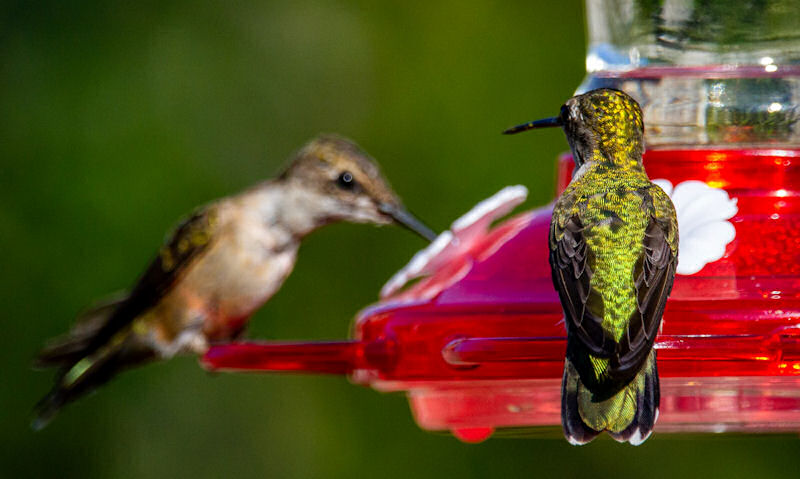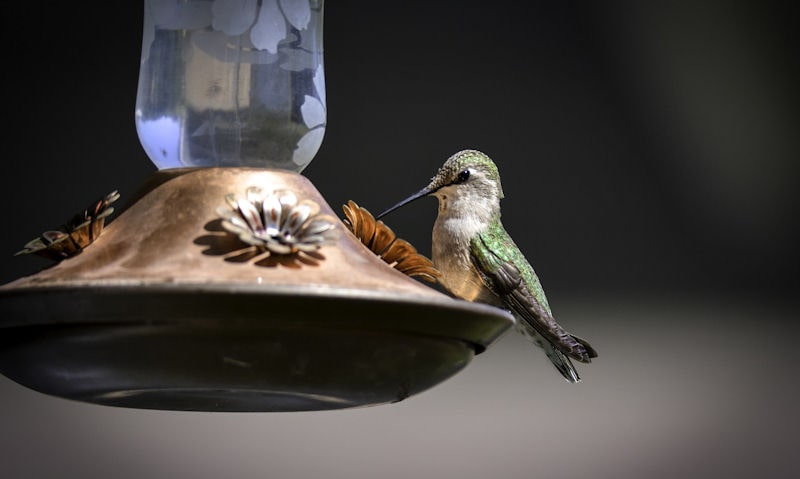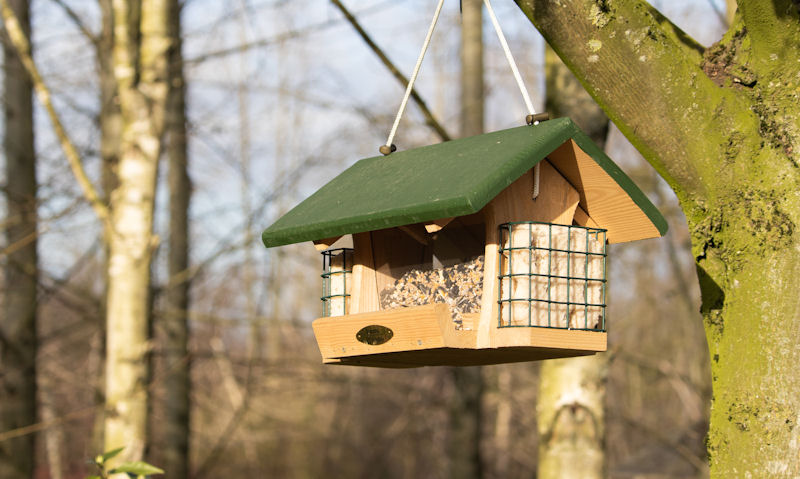Can Hummingbird feeders be in the sun
Hummingbirds feed on nectar in the wild in the sun and therefore so can they in feeders, though homemade nectar can quickly go bad in sun so its up to you to keep it at its best.
Hummingbird feeders can be in the sun if only its mild; if in the middle of drought, in a State with a hot climate or in super hot summers, then shade must be a priority. Nectar must stay at room temperature thus sun directly on it all day will spoil it - with a chance of it clouding over, the feeder must be kept cool.
Its hard to imagine a hummingbird feeder that is not setup out in a sunny area, with sun causing few issues if its stays mild with cooler evenings.
When that is not the case feeders can get to hot, with the nectar spoiling in the bottle, with an obvious sign of poor nectar being its clouded over.
With that in mind hummingbird feeders do need shade to sustains the nectar within them.
Prioritize shade for much of the day with sun only hitting the feeder when its at its weakest - which is early in the morning or into the evening, near sunset in summertime.
What you need is shade so you can make shade for feeders by situating it by a tree, a fence, the shaded side of the house or under a porch.
Hummingbird feeders hang at a minimum of 4 feet off the ground, thus any lower it will become unsafe. If you must you can hang the feeder a little lower to avoid the sun bouncing off it in the day - with a longer chain to extend it down a few more inches.
Shade is how nectar within a hummingbird feeder can survive more than a day or two.
In the end it would be safer to replace the nectar every day when the sun is at its strongest, and therefore cannot be avoided.
Hummingbird feeders can be in sun
In the summertime many of us can enjoy what can be a mild summer, thus a mild heat coming from the sun, as oppose to super hot days even wildlife struggle with.
Its mild heat you can hang or locate a hummingbird feeder in with a change of nectar every other day. Hummingbird feeders can be in the sun but in case of super hot summers - or in times of drought it must only be left out in shade.
Hummers love to feed out in the sun as its what they would normally do in the wild, with a sunny spot for feeders, hummingbirds will likely see it better while its out in the open.
Where to hang a hummingbird feeder can be in the sun with a few exceptions if located elsewhere.
Never continue to allow hummingbird feeder food to go above room temperature; nectar which consists of a sugar and water mixture can go bad if its gets too hot - with visible clouding forming on the internal bottle.
Where a hummingbird feeder can be left out in the sun, though on the downside if its too hot the nectar will quickly spoil.
You are only allowing a sunny spot at this time because hummers like it, if the nectar can't last a day then re-locate to shade only.
Hummers like to feed in sun
Hummingbirds are big sun lovers, which is why a hummingbird feeder should really be situated in the sun - as apposite to a dark shaded area, like within trees or vegetation.
Don't get me wrong hummingbirds will happily feed off a feeder in shade, only your local hummers may not be used to a non-sunny area where it may hang.
Rather than situating the hummingbird feeder in direct sun all day, the yard may allow you to locate the feeder out in the open - with the blue sky visible above - if only it can be in the shade for most of the time.
Hummers need of sun imitates the area where wild flowers grow in the wild, to which they feed on the nectar.
These same nectar producing flowers can be in a more shaded spot for much of the day, to which this can be achieved on a hummingbird feeder.
Simply hang a hummingbird feeder in the sun when its at its weakest, then ideally as the sun moves across the sky throughout the day - you will want the shade to cover the feeder when its at its hottest.
Shade is still priority
While a hummingbird feeder can be left out in the sun all day long, the feeder itself isn't going to show any signs of wear and tear any time soon.
Priority in a hummingbird feeder is the homemade sugar water mixture stored inside.
Mild summers can heat up the nectar and spoil it within a day or two. Hotter summers can spoil nectar on the same day you put it out - thus will need replacing once or twice a day, to prevent bacteria forming.
In humid conditions the sun or shade won't do a thing, its humidity that will quickly ruin the nectar - as the plastic or glass bottle its contained within will allow the environment inside to germinate with bacteria.
And here is where you need to hang hummingbird feeders in the shade as often as you can, in any one day.
Turn to the side of the house or a structure such as a shed in your yard that is only the shaded side. Similarly, natural vegetation or trees can provide cover, while allowing the feeder to remain in a lit up area.
Shade must be covering your hummingbird feeder through the day until late afternoon, then once its cooled down in the evening - the sun can be directly on the feeder.
Heat will effect Nectar quality
Conditions inside a hummingbird feeder can quickly change rapidly as the outside temperature is too hot to sustain it, while cooler conditions later can cause the germination process.
Its a no win situation when hanging a hummingbird feeder in the sun, because while hummers love it, the nectar does not.
For hummingbirds to safely feed on homemade nectar outdoors, it must remain at a constant room temperature, or else hummers won't use it.
That is just as well as the nectar at this point is way past it best, thus would need discarding whilst the hummingbird feeder is cleaned out and replaced with fresh nectar.
Heat of the sun, be it in mild summers or in super hot States can cause the nectar to be far to hot for hummingbirds to take too it. And even with shade the internal temperature can stay too hot for hummers to feed.
In this time the heat will cause the sugar water to turn cloudy, which is an indication the nectar is past its best.
Unless this same hummingbird feeder is cleaned often in summertime or in hot, humid climates - then mold will develop on the inside and out - making it dangerous for birds to use safely.
Summarizing up
You know what a hummingbird feeder can be in the sun, as the feeder itself can put up with it, with hummers loving the sun but there's a downside to all this.
Nectar inside hummingbird feeders doesn't take well to being in direct heat as it can spoil the homemade nectar before the days over.
While a sunny area in your yard can be used to hang or locate hummingbird feeders, if its a mild summers day only - shade must be a priority for as long as its possible to keep the nectar at its best.
Best way to store hummingbird feeder food is at room temperature, so as you can imagine for the feeder to be in the sun for too long, it will heat up too much.
Conditions inside the hummingbird feeder bottle will heat up and soon change temperature again; thus perfect conditions for the internal bottle to cloud over in which will tell you nectar must be changed.
With that, this kind of environment will allow bacteria to grow with mold forming unless cleaned out regularly if constantly in the sun.
Hummingbird feeders can be in a mild sun only, with even cool days the feeder is sure to benefit more in shade.
Hummers love a sunny spot but what's stopping you hanging the feeder out of the sun, but keeping it in an open, bright area in the yard.


